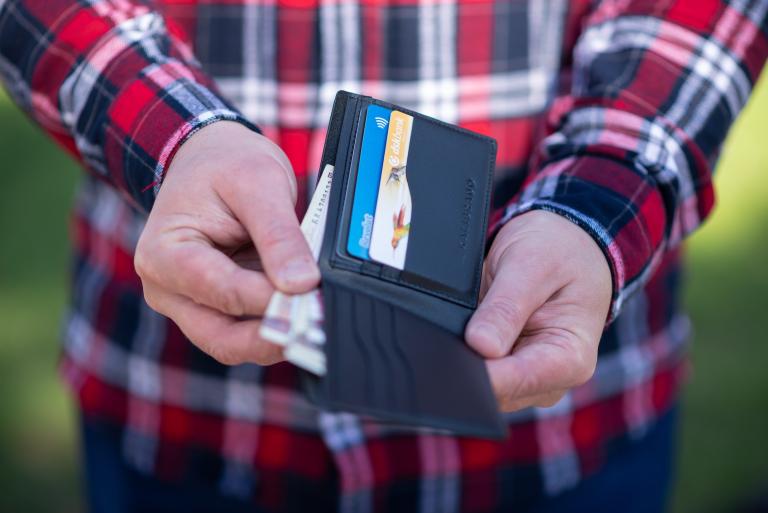Suppose you found a wallet lying on the street. You pick it up and inside you find $200 in cash, along with a few credit cards and a driver’s license. You look around and there’s absolutely no one around. The street is deserted without a soul in sight. What would you do next?
That’s the situation Russ Roberts put in front of about 100 students at an elite private high school. To my (and his) surprise, the vast majority said they would take the cash and say nothing. They reasoned that as long as no one saw them pick up the wallet, the money was theirs. Because no one saw them, “the students saw no cost in loss of reputation from pocketing the money or fear of being accosted for failing to try and find the owner.”
Roberts is an author, podcaster, and president of Shalem College and he tells this tale in his new book Wild Problems. He also points out there’s a flaw in the students’ thinking. They confuse what they want to do in their narrow self-interest as opposed to what they ought to do.
Why return the wallet? Here are two reasons.
According to Roberts, there are a couple of reasons you might consider returning the wallet. The first reason to return it to its proper owner is this: “The pleasure you get from pleasing the owner of the wallet can be larger than the pleasure you receive from spending the money.” In other words, our honorable actions can help us feel just as good as if we kept the money.
But Roberts also stresses there’s an even better reason to return the wallet: It’s the right thing to do. His thinking goes like this:
The goal of life isn’t simply to milk our experience for the maximum amount of pleasure over pain. Sometimes you do the right thing simply because you should. You may feel miserable making that sacrifice, but you do it anyway because you aspire to be an honest person.
So the bottom line is, if you kept the wallet, you would have actually betrayed yourself. Whether someone saw you pick up the wallet or not, “Your decisions define who you are.” Roberts isn’t talking about the public perception of who you are, but your own self-definition. When you live with honesty and integrity and do the right thing, you’re respecting yourself.
Making right decisions also helps us to flourish.
Roberts explains that in life, most of us want to “flourish.” One meaning of the word is to be successful, usually in a financial sense. But the second meaning is to “fulfill our human potential” and to live our lives wisely and fully. We want to become the best person we can possibly be.
That means more than simply accumulating pleasures and avoiding pain. Flourishing includes living and acting with integrity, virtue, purpose, meaning, and dignity.
The choices we make define who we are and help give our lives meaning. When our lives are guided by the desire to do the right thing, many of the decisions we make become easier. And that’s not just figuring out what’s the right thing for me personally—but how my decisions affect those around me, whether it’s a friend, family member, or even a complete stranger.
Roberts reminds us: “You’re not the center of the universe.” When we make a decision to keep or return a lost wallet—as with many decisions we make in life—our choices impact others. When we make the decision to keep a found wallet, we have entered another person’s story. They may not know us, they may never meet us, but our decision impacts their life.
That requires some level of self-awareness—being aware of how your actions and words affect others and how you’re perceived. Self-awareness can come from therapy, meditation, religion, or reading philosophy or literature.
It’s all about following the Golden Rule.
You might know it from the Bible’s Matthew 7:12: “Do unto others as you would have them do unto you.” But it’s a principle found in virtually all major religions and philosophies. In Taoism, there’s a slight tweak to this sentiment: “Regard your neighbor’s gain as your own gain and your neighbor’s loss as your own loss.” In other words, we’re all in this together.
The philanthropist John Templeton, writing in Worldwide Laws of Life, recommends that you “never do anything that you’ll have to punish yourself for” later. In situations like this, he suggests we ask ourselves “How would you feel if others found out?” He states that:
Hiding a selfish or uncaring act deep down inside doesn’t make it go away. Often it festers, and you begin to feel guilty and ashamed. Even if no one knows but you, those bad feelings can come back to haunt you whenever you think about them.
Ultimately, you’re the one who benefits by living with honor and integrity. It can make you feel better about yourself. It helps others feel better about the world we jointly occupy. It’s what separates a person of good character from one lacking in it. So ask yourself: What would you do if you found that wallet?


















